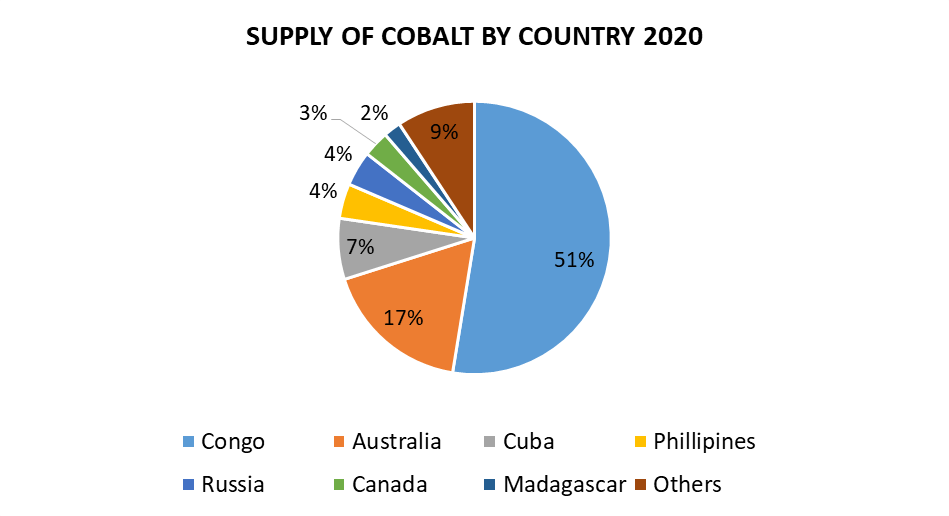Cobalt Market Outlook: Assessing The Long-Term Impact Of Congo's Export Ban And Quota System

Table of Contents
The DRC's Cobalt Dominance and its Geopolitical Significance
The DRC's dominance in cobalt production is undeniable. Understanding this dominance is crucial for any meaningful Cobalt Market Outlook.
Cobalt Production in the DRC: Current Figures and Future Projections
- The DRC currently accounts for over 70% of global cobalt production, making it the undisputed leader in the market.
- Current annual production estimates hover around 100,000-120,000 tonnes, but this figure fluctuates due to various factors, including political instability and infrastructure limitations.
- Future projections vary considerably, depending on investment levels, government policies, and the global demand for cobalt. Some forecasts predict continued growth, while others suggest potential stagnation or even decline without significant investment in sustainable and ethical mining practices.
- Artisanal mining, while contributing significantly to overall production, is fraught with ethical concerns and poses challenges to accurate production data and environmental regulations. Industrial mining operations, while more regulated, face their own sets of challenges, including infrastructure limitations and access to capital.
Geopolitical Risks and Supply Chain Vulnerabilities
The DRC's political landscape is often unstable, creating significant geopolitical risks that impact cobalt supply chains.
- Political instability, armed conflict, and corruption within the DRC can lead to disruptions in cobalt mining and export activities, resulting in supply chain bottlenecks and price spikes.
- Ethical sourcing and human rights issues, including child labor in artisanal mines, are significant concerns that taint the cobalt industry's reputation and create pressure for stricter regulations.
- The heavy reliance on a single source nation creates a significant vulnerability for global supply chains. Diversification strategies, involving increased exploration and investment in cobalt production in other countries like Australia, Canada, and Zambia, are vital to mitigating this risk.
Analyzing the Impact of Congo's Export Ban and Quota System
Congo's recent export restrictions have had a profound and multifaceted impact on the Cobalt Market Outlook.
Immediate Effects on Cobalt Prices and Market Volatility
The imposition of export bans and quotas has created immediate market volatility.
- Cobalt prices have experienced significant fluctuations, reflecting market uncertainty and speculative trading. Short-term supply disruptions have caused dramatic price increases, impacting downstream industries like EV battery manufacturers.
- Market speculation, driven by concerns over supply shortages, has further exacerbated price volatility, making it difficult for businesses to plan long-term investments.
- The ripple effect on downstream industries is substantial, as battery manufacturers face increased input costs, potentially leading to delays in EV production and higher consumer prices.
Long-Term Consequences for Cobalt Supply and Demand
The long-term implications of Congo's export policies are far-reaching and require careful consideration.
- The restrictions could incentivize increased investment in cobalt mining outside the DRC, leading to greater diversification of supply sources and reduced reliance on a single nation.
- The increased costs and uncertainties associated with cobalt supply could spur the development and adoption of alternative battery technologies, such as those using lithium-iron phosphate (LFP) chemistries that require less or no cobalt.
- Recycling and reuse of cobalt from end-of-life products will become increasingly important in mitigating future supply shortages and promoting a more sustainable approach to cobalt management.
Strategic Responses and Future Outlook for the Cobalt Market
Navigating the complexities of the Cobalt Market Outlook requires a multifaceted approach.
Investment Strategies and Diversification Efforts
Strategic investments are crucial for shaping a more secure and sustainable cobalt future.
- Increased investment in cobalt exploration and production in other countries will contribute to a more diversified and resilient supply chain. This requires a commitment to responsible and sustainable mining practices.
- The development and implementation of sustainable and ethical cobalt mining practices are not only ethically imperative but also necessary to secure long-term access to this critical resource. This involves addressing environmental concerns, promoting worker safety, and respecting human rights.
- Technological advancements in cobalt extraction and processing, such as improved hydrometallurgical techniques and efficient recycling methods, can improve efficiency and reduce the environmental footprint of cobalt production.
Policy Recommendations for Stable Cobalt Supply
International cooperation and effective policies are essential for stabilizing the cobalt market.
- International cooperation is necessary to promote responsible sourcing and address the ethical challenges within the cobalt mining industry. This could involve the creation of international standards and certification schemes.
- Government policies promoting sustainable cobalt mining and processing, including environmental regulations and incentives for responsible practices, are essential for fostering a healthy and ethical industry.
- International organizations can play a significant role in promoting ethical practices, supporting sustainable development initiatives, and facilitating information sharing among stakeholders.
Conclusion: Navigating the Future of the Cobalt Market
The long-term impact of Congo's export policies on the Cobalt Market Outlook is uncertain but undeniably significant. Understanding the geopolitical risks and supply chain vulnerabilities associated with cobalt production is paramount. Diversification, sustainable mining practices, and responsible sourcing are no longer optional but essential for securing a stable and ethical supply of this crucial mineral. The future of the cobalt market hinges on a concerted effort from governments, industry stakeholders, and international organizations to promote transparency, accountability, and sustainability. Stay informed about the evolving Cobalt Market Outlook and engage in discussions surrounding responsible sourcing and sustainable mining practices within the cobalt industry. Further research into the "Cobalt Market Outlook" and related topics, such as ethical sourcing, battery technology alternatives, and responsible mining practices, is highly encouraged.

Featured Posts
-
 Anthony Edwards Facing Backlash The Baby Mama Drama Unfolds
May 15, 2025
Anthony Edwards Facing Backlash The Baby Mama Drama Unfolds
May 15, 2025 -
 Paysandu Vs Bahia Resumen Del Partido Y Goles 0 1
May 15, 2025
Paysandu Vs Bahia Resumen Del Partido Y Goles 0 1
May 15, 2025 -
 Disparities In Trust Exploring The Relationship Between Gender Race And Confidence In Evanstons Tap Water
May 15, 2025
Disparities In Trust Exploring The Relationship Between Gender Race And Confidence In Evanstons Tap Water
May 15, 2025 -
 Npo Toezichthouder Belooft Actie Na Gesprek Omtrent Frederieke Leeflang
May 15, 2025
Npo Toezichthouder Belooft Actie Na Gesprek Omtrent Frederieke Leeflang
May 15, 2025 -
 The Single Biggest Obstacle For Top Nba Teams
May 15, 2025
The Single Biggest Obstacle For Top Nba Teams
May 15, 2025
